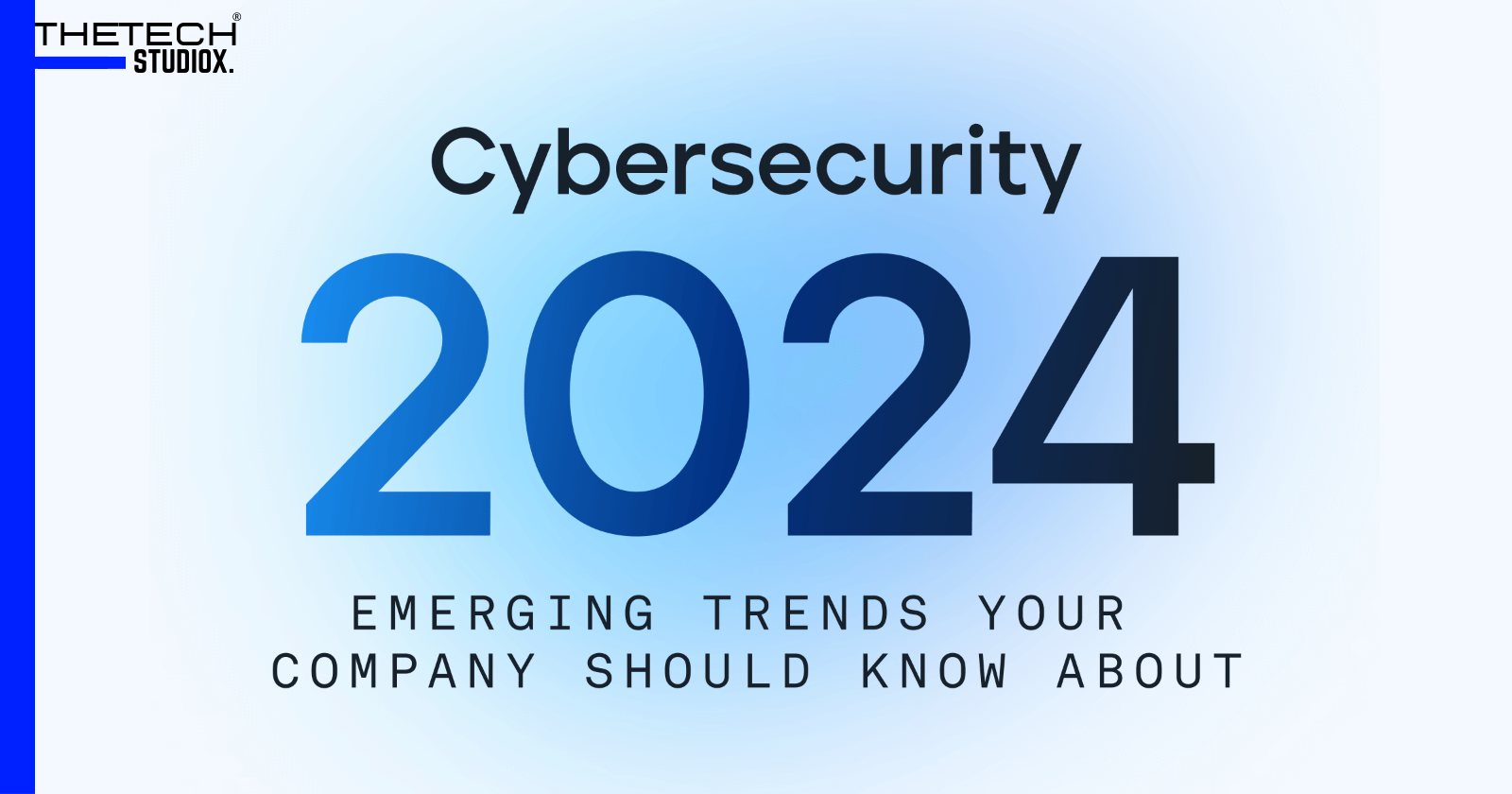Table of Contents
Introduction: The Intersection of AI and Cybersecurity Trends
In the ever-evolving landscape of technology, the fusion of artificial intelligence (AI) and cybersecurity has become a focal point for businesses and individuals alike. As we delve into 2024, it’s crucial to understand the trends shaping the cybersecurity sector and how AI continues to influence its trajectory.
The AI Revolution of 2023

The Impact of AI on Business Operations
The year 2023 witnessed a remarkable surge in AI adoption across various industries. Businesses embraced AI technologies to streamline operations, automate tasks, and enhance decision-making processes. From optimizing workflows to improving customer experiences, AI has become an indispensable tool for organizations seeking competitive advantages.
Concerns and Challenges with AI Implementation
However, alongside its transformative potential, AI deployment has raised concerns regarding ethical considerations and security implications. Instances of AI-driven fraudulent activities, such as ransomware attacks and phishing campaigns, have underscored the need for robust security measures and regulatory frameworks. As AI capabilities continue to evolve, addressing these challenges remains paramount to safeguarding digital assets and maintaining trust in technological advancements.
What’s Next in Cybersecurity?

Continuing Concerns with Data Privacy
In the upcoming year, data privacy will remain a pressing issue for businesses and consumers alike. Despite heightened awareness, many organizations struggle to maintain adequate IT hygiene, exacerbated by limited budgets and resource constraints. The growing complexity of cyber threats underscores the importance of proactive cybersecurity measures and strategic investments in risk mitigation strategies.
The Importance of Tightened IT Budgets
While economic uncertainties loomed in 2023, the resurgence of global markets signals a renewed focus on technological innovation and resilience. However, small businesses, particularly in the healthcare sector, remain vulnerable to cyber threats due to constrained budgets and resource allocations. As cybersecurity emerges as a top priority, organizations must prioritize investments in robust defense mechanisms and talent development initiatives.
Talent Development and Diversity in Cybersecurity
Increasing Demand for Cybersecurity Professionals
Despite the rising demand for cybersecurity expertise, there remains a significant shortage of skilled professionals in the field. Efforts to diversify the talent pool, particularly among women and minorities, are essential for addressing this gap and fostering innovation in cybersecurity practices. With cyber threats evolving in sophistication, investing in talent development programs is critical for building resilient cyber defenses.
Importance of Involving the Younger Generation
In an era defined by digital connectivity, engaging the younger generation in cybersecurity education and awareness initiatives is imperative. By fostering a culture of cybersecurity consciousness early on, we empower future generations to navigate cyberspace securely and contribute to ongoing efforts in cybersecurity innovation. Collaboration between educational institutions, industry partners, and government agencies is key to nurturing a pipeline of skilled cybersecurity professionals.
Challenges Across Industries
The Resilience of Financial Institutions
While larger financial institutions have fortified their cyber defenses, smaller businesses, such as credit unions and mortgage brokers, remain susceptible to AI-powered cyberattacks. As cyber threats continue to evolve, organizations must prioritize cybersecurity investments and collaborative partnerships to mitigate risks effectively.
Vulnerabilities in Smaller Businesses
Smaller businesses, particularly those with limited resources, face significant challenges in combating cyber threats. As cybercriminals target vulnerabilities in supply chains and digital infrastructure, proactive cybersecurity measures are essential for safeguarding sensitive data and maintaining business continuity. Investing in robust cybersecurity solutions tailored to the needs of small businesses is critical for mitigating risks and enhancing resilience.
The Role of Security Partnerships
Amidst the evolving threat landscape, strategic partnerships with cybersecurity experts play a pivotal role in strengthening organizational defenses. By leveraging the expertise and resources of security partners, businesses can enhance threat intelligence capabilities, implement proactive security measures, and respond effectively to emerging cyber threats. Collaboration and information sharing across industry sectors are essential for fostering a collective defense against cyber adversaries.
Opportunities and Innovations in 2024
As we embark on the journey into 2024, the cybersecurity landscape presents a myriad of opportunities for innovation and growth. With the job market rebounding and technological advancements accelerating, there is immense potential for transformative developments in cybersecurity practices and technologies. By embracing a proactive approach to cybersecurity and fostering collaboration across stakeholders, we can navigate the challenges of an AI-driven era and unlock new possibilities for securing digital ecosystems.
Conclusion
In conclusion, the intersection of AI and cybersecurity heralds both unprecedented challenges and opportunities in 2024. As AI continues to reshape business operations and cyber threats evolve in sophistication, organizations must prioritize cybersecurity investments, talent development initiatives, and collaborative partnerships to navigate the complexities of the digital landscape. By fostering a culture of cyber resilience and innovation, we can harness the transformative potential of AI while safeguarding against emerging cyber threats.
Also Read: The Rise of Bhutan’s Bitcoin Mining Operation on its Failed ‘Education City’
FAQs
What are the primary cybersecurity concerns for businesses in 2024?
Businesses face ongoing challenges with data privacy, AI-driven cyber threats, and resource constraints in cybersecurity management.
How can organizations address the shortage of cybersecurity professionals?
Organizations can invest in talent development programs, promote diversity in cybersecurity roles, and collaborate with educational institutions to nurture a skilled workforce.
What role do small businesses play in cybersecurity resilience?
Small businesses are vulnerable to cyber threats due to limited resources, highlighting the importance of proactive cybersecurity measures and collaborative partnerships with security experts.
How can individuals contribute to cybersecurity awareness?
Individuals can stay informed about cyber threats, practice good cybersecurity hygiene, and advocate for cybersecurity education initiatives in their communities.
What are the key trends shaping cybersecurity in 2024?
Key trends include increased AI integration, heightened focus on data privacy, talent development initiatives, and collaborative security partnerships.





[…] a renowned cybersecurity firm, has identified a troubling trend—a sophisticated mobile Trojan meticulously targeting iOS […]
[…] rise of the Quantum CISO marks a significant milestone in the field of cybersecurity. As organizations grapple with the implications of quantum computing, the role of Quantum CISOs […]
[…] for These Cybersecurity AI Trends in 2024 Cybersecurity‘s future hinges on how well AI adapts, learns, and collaborates with human experts. Staying […]
I don’t think the title of your article matches the content lol. Just kidding, mainly because I had some doubts after reading the article.
Can you be more specific about the content of your article? After reading it, I still have some doubts. Hope you can help me.